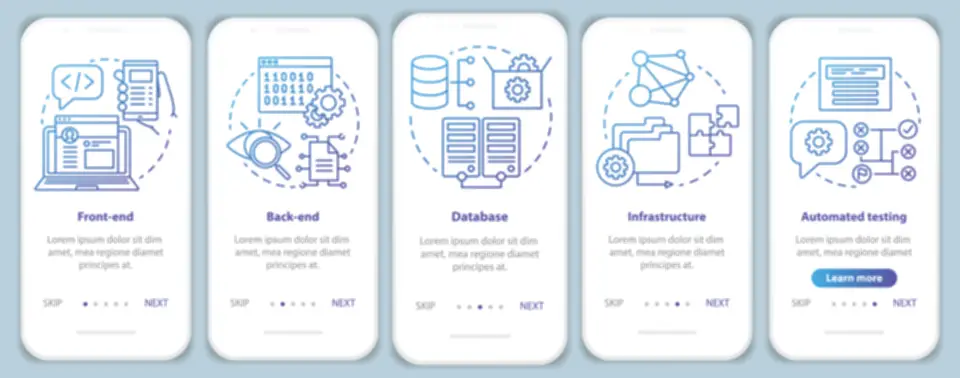Top 20+ Python Projects With Source Code 2023

If your code is not formatted properly or doesn’t type check, GitHub will fail to build. If you’re not sure which to choose, learn more about installing packages. But if you want to customize any part of the process, then it gives you all the freedom to do so. After creating your cleaning module, you can now head back over to bot.py and integrate the code into your pipeline.
If you need to brush up on your Python concepts, you can check out this free course in Python for beginners. To avoid any overlap for stealing someone’s work, we tend to put our work through plagiarism checkers. So, with this Python project, you can create a plagiarism checker to scour through any writing work.
Build custom chatbot applications using OpenChatkit models on Amazon SageMaker Amazon Web Services – AWS Blog
Build custom chatbot applications using OpenChatkit models on Amazon SageMaker Amazon Web Services.
Posted: Mon, 12 Jun 2023 07:00:00 GMT [source]
Now, Claude 2.1, Anthropic’s most advanced chatbot yet, is available for users to try out. Now, Gemini runs on a language model called Gemini Pro, which is even more advanced. This is only currently available to ChatGPT Plus customers, who can also create images with the DALL-E integration – something which helps ChatGPT remain the best chatbot on the market in 2024. Create a simple Python program that takes a user’s name and pronouns as input and then reminds the user to use those pronouns in a sentence. For example, if the user inputs “Alex” and “they/them,” the program should output a message like, “Alex uses they/them pronouns! ” You’ll learn how to assign variables with user input in Learn Python 3.
Installing from GitHub¶
With its strong emphasis on machine learning, DeepPavlov enables developers to build sophisticated chatbot systems that can handle complex interactions with users. SpaCy is another powerful NLP library designed for efficient and scalable processing of large volumes of text. It offers pre-trained models for various languages, making it easier to perform tasks such as named entity recognition, dependency parsing, and entity linking. SpaCy’s focus on speed and accuracy makes it a popular choice for building chatbots that require real-time processing of user input. Python has emerged as one of the most powerful languages for AI chatbot development due to its versatility and extensive libraries. With Python, developers can create intelligent conversational interfaces that can understand and respond to user queries.
- This integration allows chatbots to leverage the capabilities of these services, such as cloud-based hosting and team collaboration features.
- As technology continues to evolve, developers can expect exciting opportunities and new trends to emerge in this field.
- Moreover, privacy requests don’t sync across devices or browsers, meaning that users must submit separate requests for their phone, laptop and so on.
- These projects are for intermediate users who have some knowledge and wish to create more.
- The final else block is to handle the case where the user’s statement’s similarity value does not reach the threshold value.
In this step, you’ll set up a virtual environment and install the necessary dependencies. You’ll also create a working command-line chatbot that can reply to you—but it won’t have very interesting replies for you yet. If you’re comfortable with these concepts, then you’ll probably be comfortable writing the code for this tutorial. If you don’t have all of the prerequisite knowledge before starting this tutorial, that’s okay! You can always stop and review the resources linked here if you get stuck.
Now, you will create a chatbot to interact with a user in natural language using the weather_bot.py script. To build your own customized chatbot, you can leverage the capabilities of the open-source Python libraries mentioned above and utilize machine learning techniques. Integrating the chatbot with various platforms like Facebook, Slack, and Telegram is also possible.
Natural Language Tool Kit (NLTK) for Python Language Processing
By the end of the process, you’ll have a fully functional, expertly designed website ready to launch. It offers over 120 realistic AI voices with different characteristics and styles, so finding one that suits your needs is guaranteed. Another way to speed up the writing process is to use an AI grammar tool.
The ChatterBot library combines language corpora, text processing, machine learning algorithms, and data storage and retrieval to allow you to build flexible chatbots. With GPT-4, users can create images within text chats and refine them through natural language dialogues, albeit with varying degrees of success. GPT-4 also supports voice interactions, enabling users to speak directly with the model as they would with other AI voice assistants, and can search the web to inform its responses. Anthropic’s Claude can analyze uploaded files, such as images and PDFs, but does not support image generation, voice interaction or web browsing. Although Java is faster, Python is more versatile, easier to read, and has a simpler syntax. According to Statista, this general use, interpreted language is the third most popular coding language among developers worldwide [3].
Australian Library Uses Chatbot To Imitate Veteran With Predictable Results – Hackaday
Australian Library Uses Chatbot To Imitate Veteran With Predictable Results.
Posted: Fri, 26 Apr 2024 07:00:00 GMT [source]
This AI provides numerous features like learning, memory, conditional switch, topic-based conversation handling, etc. The future of chatbot development with Python holds great promise for creating intelligent and intuitive conversational experiences. With ongoing advancements in NLP and AI, chatbots built with Python are set to become even more sophisticated, enabling seamless interactions and delivering personalized solutions. As the field continues to evolve, developers can expect new opportunities and challenges, pushing the boundaries of what chatbots can achieve.
Content creators and educators will love Winston AI for its AI content detection. The paid version also provides a plagiarism detector, so you can get a handle on any issues before publishing content. Grammarly is a must for content writers, students, marketing professionals, or anyone looking to improve their grammar and correct mistakes automatically. It checks for plagiarism python chatbot library and integrates with browsers, social media, email, WordPress, and more, making it a versatile proofreading tool. Grammarly is an AI-powered grammar and writing assistant that helps users improve their writing by identifying and correcting grammar, spelling, punctuation, and style errors. Content is the cornerstone of marketing, business communication, and everything in between.
Therefore, you can be confident that you will receive the best AI experience for code debugging, generating content, learning new concepts, and solving problems. Copy.ai is a multi-purpose writing tool that excels in generating all types of content, including products, ads, blog headlines, social media content, and more. Built on OpenAI’s GPT large language model (LLM), it helps users write more effective copy. Furthermore, with support for over 25 languages, Copy AI emerges as the ultimate writing assistant for creating effective ads.
Freshworks Freddy AI can improve efficiency, automate tedious marketing tasks, provide personalized decision-making insights, and completely transform customer service practices. Alli AI offers a 10-day free trial with paid plans starting at $299 per month. Surfer SEO is ideal for digital marketers, content creators, and website owners aiming to optimize their content, boost search engine rankings, and outperform competitors in search results. Hostinger AI Website Builder stands out for its value for money and comprehensive features. Its sophisticated AI tools and eCommerce capabilities make it a top choice for anyone looking to establish a strong online presence quickly and efficiently. Lovo AI offers a free trial with paid plans starting at $29 per month.
However, they will there were more supported languages for the AI copywriting tool. Pro Rank Tracker is an AI-driven search engine optimization tool that helps businesses improve their online visibility by tracking keyword rankings and providing insightful reports. Connect it with your Google Search Console (GSC) account, and it starts pulling in all the data points. Best of all, it tracks and displays ranking history so you can tell how your websites are performing over time. Alli AI users love the keyword focus suggestions, keyword tracking, and support but say it needs to clarify which images are missing alt tags.
Pictory AI is an AI-powered video generator that creates visually stunning branded videos from long-form, written content. Give it a URL with your published content, and it can pull it into its AI models. From there, it can choose the best content, create voiceovers, and assign rich media to make a video worth publishing. Descript offers a free plan with paid plans starting at $15 per month.
Divi AI helps agencies and business owners create websites faster with complete page builds. Describe the web page you want Divi AI to build, and it’ll create an entire page, section by section. When Divi AI is done creating your page, everything is editable via the visual builder. Plus, you can layer in Divi AI to generate specific sections of text or images to dial things in further. Lovo AI is an AI-powered text-to-speech generator that allows users to convert written text into natural-sounding audio in various voices and languages.
- The step-by-step guide below will walk you through the process of creating and training your chatbot, as well as integrating it into a web application.
- Your chatbot has increased its range of responses based on the training data that you fed to it.
- Develop a Python program that checks a given text for the use of inclusive language.
- Whether it’s tokenization, stemming, tagging, parsing, classification, or semantic reasoning, NLTK offers a plethora of tools and resources to handle these tasks efficiently.
- With Botsonic, you can edit the knowledge base of any bot you’re building by uploading documents, and you even import a bot you’ve made using a GPT language model into Writesonic.
- Building Python AI chatbots presents unique challenges that developers must overcome to create effective and intelligent conversational interfaces.
Murf.AI users like the variety of AI voices and options with paid plans. Play.ht users are impressed with the output, especially in languages other than English. However, some users say it may take several tries to get the AI voice where you want it, using up valuable character credits.
The simplicity of Python makes it accessible for beginners, while its robust capabilities satisfy the needs of advanced developers. Python chatbot development offers a groundbreaking approach for creating intelligent and interactive chatbots. Using DeepPavlov, developers can leverage the capabilities of TensorFlow and Keras to build chatbots with advanced conversational AI functionalities. The library supports Python 3.6 and 3.7, making it accessible to a wide range of developers.
The bot created using this library will get trained automatically with the response it gets from the user. NLTK, the Natural Language Toolkit, is a popular library that provides a wide range of tools and resources for NLP. It offers functionalities for tokenization, stemming, lemmatization, part-of-speech tagging, and more. With NLTK, developers can easily preprocess and analyze text data, allowing chatbots to extract relevant information and generate appropriate responses. ChatterBot is a Python library designed to make it easy to create software that can engage in conversation. It uses a selection of machine learning algorithms to produce different types of responses.
While other tools make standard .jpg images, this tool produces editable vectors you can rework and resize once downloaded. Chatbase is best suited for small to medium businesses looking for a user-friendly chatbot solution with robust analytics capabilities, customization options, and multilingual support. HubSpot’s Free AI Email Writer is a tool designed to streamline the email marketing process. Powered by advanced artificial intelligence, this tool generates compelling and personalized email content to engage your audience and drive conversions. Scalenut is an AI writer who focuses on a total content creation workflow from start to finish.
Our top picks give you the tools to boost revenue or build sales leads so you’ll have more time to focus on other tasks. People looking to dip into the AI pool will benefit most from Murf.AI. The free plan grants full access, minus downloads, to check out all features. Its ease of use, realistic-sounding voices, and support for 20 languages make it a great option. Those who convert written text into a voice should look at AI voice generators. They use artificial intelligence and deep learning to turn text into a natural-sounding human voice.
With its visual flow builder, developers can easily design conversation flows and create engaging interactions with users. Whether you are a beginner or an experienced developer, BotPress offers a range of features and integrations that make chatbot development using Python a breeze. TextBlob is a powerful Python library for processing textual data with built-in natural language processing (NLP) features. It provides a simple yet effective API for performing various NLP tasks, such as part-of-speech tagging, noun phrase extraction, sentiment analysis, and more. TextBlob is widely used in industries like finance, marketing, and customer service to analyze and understand text data. These libraries provide a comprehensive range of features, enabling developers to tokenize, classify, and extract information from large volumes of text.
You can foun additiona information about ai customer service and artificial intelligence and NLP. You have created a chatbot that is intelligent enough to respond to a user’s statement—even when the user phrases their statement in different ways. The chatbot uses the OpenWeather API to get the current weather in a city specified by the user. One of the key features of spaCy is its ability to perform advanced text processing tasks, such as tokenization, part-of-speech (POS) tagging, and sentence boundary detection (SBD).

Quillbot is perfect for content creators who need to rephrase text, create unique content, and avoid plagiarism issues, ensuring content quality and originality. Users love how easy it is to load data into Chatbase but say despite being trained on user data, it occasionally produces incorrect answers. HubSpot’s Free AI Email Writer best suits marketers and businesses looking to streamline email marketing efforts and increase engagement with personalized content. Whether you’re a small business owner or a seasoned marketer, this tool offers valuable assistance in crafting compelling email campaigns that resonate with your audience. Scalenut caters to content creators and SEO specialists who need to generate unique, engaging, and optimized written content at scale, improving content marketing efforts.
So, the Website Blocker Python project’s goal is to block websites from any device. By blocking websites from the user’s device, this project will help them stay away from distractions as they will not be able to open them. GTTS(Google Text to Speech)As the following example shows, doing text-to-speech with Chat GPT one line of code is very simple. Converting Generated Text to speechIn Python, you can convert speech to text in a variety of ways.We will use Google Text to Speech to convert our decoded text into audio in this project. Disable escaping of non-ascii characters, see json.dumps() for more information.
When it comes to search engine optimization (SEO), marketers and content creators can spend nearly endless amounts of time optimizing for it. With artificial intelligence involved, it’s easier than ever to streamline SEO. They can help automate tasks like keyword research, content optimization, and generating SEO-rich content to improve your site’s position in the search engine ranking pages (SERPs). Hostinger offers an AI-driven website builder that makes building and designing a website easy, even for those with no coding experience. The AI tool uses data and algorithms to suggest design elements and layouts, speeding up the process of creating a professional-looking website.

The community says Copy.ai is great for generating and improving all types of copy but can sometimes generate inaccurate results. Users appreciate Adzooma’s campaign management tools, but navigating between accounts can be frustrating. Fans of Pro Rank Tracker say creating reports is effortless, but understanding them is a different story. Alli AI is an excellent choice for agencies managing multiple websites aiming to improve search rankings and drive new organic traffic, thanks to its AI-powered SEO optimization. Fans of Surfer SEO love the content writer, integrations, and ability to create topic clusters. People, especially beginners, love how effective Copilot is in helping them learn to code.
Every day, there is something new and exciting to try to impress others on social media. You can find free and open image generation, speech generation, LLMs, and multimodal models. AI SDK requires no sign-in to use, and you can compare multiple models at the same time. It is fast and provides additional options to modify and improve the model response. Also, you can sync the prompt or use each model for a different prompt.
As businesses and individual professionals strive for greater agility and efficiency, artificial intelligence (AI) is becoming increasingly important. Furthermore, AI tools are increasingly adopted for productivity and simplifying business operations. Whether it’s AI-powered content writing, sentiment analysis, or image/video generation and predictive analytics, AI is changing how we work. In the following sections, this article explores the best AI tools available to help you optimize productivity on multiple fronts.
It provides an all-in-one solution for customer interaction and retention. Tidio is an AI website chatbot with a wealth of features designed to connect you to potential and existing customers. It provides live chat and several AI features, including AI Phrase Matcher, a FAQ Wizard, and Help Desk. Users can gain insight into your business with pre-defined questions and answers or be handed off to a live representative should the need arise.
And Python can indeed be a great language to handle every such demand, efficiently. For example, pydev provides auto-completion and debugging support for python with all the other eclipse goodies like svn support. In this situation, tokenizing helps to fragment large text datasets into small, readable chunks (like words). Afterwards, you can also lemmatize a word, which transforms it into its lemma form. Afterwards, it creates a pickle file to store the Python objects used to predict the bot’s responses.

You should now be able to interact with the application through the user interface. Code Explorer leverages the power of a RAG-based AI framework, providing context about your code to an existing LLM model. Conversational AI serves as a bridge between machine and human interaction. The demand for this technology has been on an upward spiral with organizations increasingly embracing it across the world. According to a report, the size of the global conversational AI market will grow to $15.7 billion by the year 2024, at a Compound Annual Growth Rate of 30.2% during the forecast period. If you already have ChatterBot installed and you want to check what version you
have installed you can run the following command.
With Python chatbot libraries, developers can unlock endless possibilities for building intelligent and personalized chatbot experiences. Python chatbot libraries empower developers to create chatbots that can understand user inputs, adapt dynamically, and even converse in multiple languages. With just a few simple commands using pip, developers can quickly set up the library and start building their chat-based applications. ChatterBot provides a flexible framework that allows developers to customize and train their chatbots to meet specific requirements.
By following this step-by-step guide, you will be able to build your first Python AI chatbot using the ChatterBot library. With further experimentation and exploration, you can enhance your chatbot’s capabilities and customize its responses to create a more personalized and engaging https://chat.openai.com/ user experience. Chatbots have become an integral part of various industries, offering businesses an efficient way to interact with their customers and provide instant support. There are different types of chatbots, each with its own unique characteristics and applications.
In this guide, you will learn how to leverage Python’s power to create intelligent conversational interfaces. TextBlob is a library for processing textual data which is written in Python language. The library provides a simple API for working into common NLP tasks, such as part-of-speech tagging, noun phrase extraction, sentiment analysis, and more. This library runs on Python versions 2 and 3, and it focuses on providing access to common text-processing operations through a familiar interface.

Hybrid chatbots offer a flexible solution that can adapt to different conversational contexts. It has comprehensive and flexible tools that let developers and NLP researchers create production-ready conversational skills and complex multi-skill conversational assistants. Natural Language Tool Kit – or NLTK – is an open-source suite of libraries and programs for building programs in Python language. This tutorial assumes you are already familiar with Python—if you would like to improve your knowledge of Python, check out our How To Code in Python 3 series.
In this section, you will learn how to build your first Python AI chatbot using the ChatterBot library. With its user-friendly syntax and powerful capabilities, Python provides an ideal language for developing intelligent conversational interfaces. The step-by-step guide below will walk you through the process of creating and training your chatbot, as well as integrating it into a web application. With the open-source Python libraries mentioned above, developers have the tools to build their own customized chatbots.
As a next step, you could integrate ChatterBot in your Django project and deploy it as a web app. Once you’ve clicked on Export chat, you need to decide whether or not to include media, such as photos or audio messages. In the previous step, you built a chatbot that you could interact with from your command line. The chatbot started from a clean slate and wasn’t very interesting to talk to.




